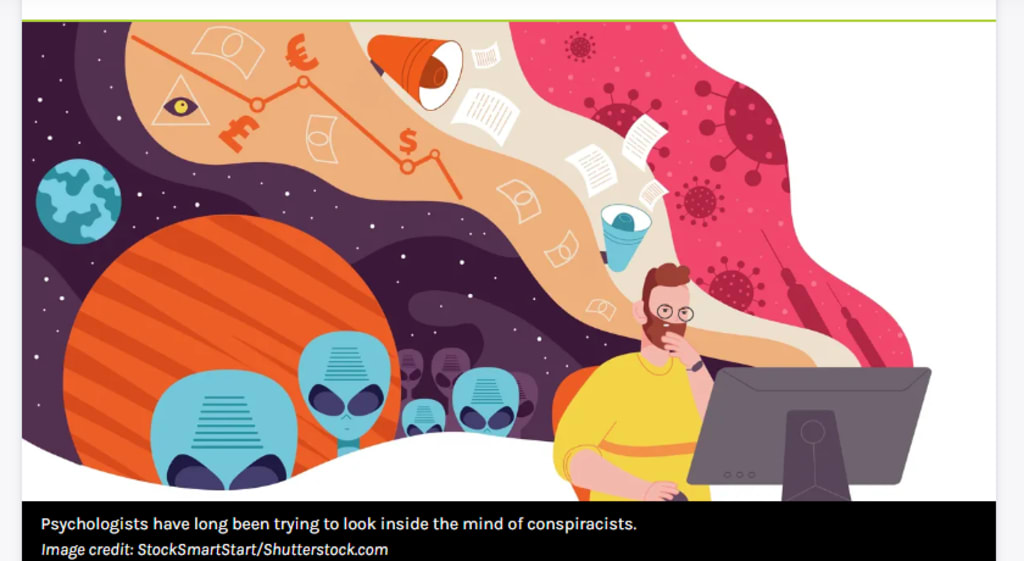The Conspiracy Brains Here's How Theorists Differ From One Another
What is it about the human brain that can send someone down the rabbit hole?

You don't have to search far in our hyperconnected society to find someone promoting conspiracy theories, from the classic Flat Earth movement to QAnon "truthers" and anti-vaccine fanatics. Friends and relatives are frequently shocked when someone slips into the dark world of conspiracies. After all, how can a once sensible person become convinced that dinosaurs don't exist? Psychology, though, may have a solution.
Numerous scientific studies have been motivated by the desire to understand the factors that lead individuals to believe in conspiracies. One aspect of the human brain seems to take the brunt of the blame, but the difficulty is that we wouldn't be able to function without it.
Pattern recognition is ingrained in the brain. This has been quite helpful as humans have evolved. For example, it's useful to know that red frequently denotes "danger." The transition from, "Hmm, we seemed to have lost some ships," to, "There must be an eldritch triangle of ocean-consuming vessels like there's no tomorrow!" is less useful.
"Our brain is always attempting to interpret the external environment. The brain uses patterns and statistical regularities in the environment—to help it make decisions about how to respond or behave to survive. This is one method the brain achieves this aim. Associate Professor Dr. Jess Taubert of the University of Queensland's School of Psychology
When this ability to recognize patterns goes into overdrive and joins dots in random data or adds two and two to get five, problems start to appear. We refer to this idea as illusory perception.
This was further investigated in a 2017 study that was published in the European Journal of Social Psychology. Groups of up to 401 participants were put through five experiments by the experts.
to investigate the connection between the perception of illusory patterns and conspiratorial thinking.
One finding of the study was a connection between identifying a pattern in a sequence of arbitrary coin flips and believing in several popular conspiracies, such as those involving the moon landing, climate change, and the assassination of JFK. People who tended to think more conspiratorially were also more likely to see patterns in chaotic works of art, such as the splatter paintings by Jackson Pollock.
The researchers also looked into the widely held fact in conspiracy circles that acceptance of one illogical idea is frequently a sign of acceptance of other, unrelated beliefs. If you can accept that Barack Obama is a reptile dressed like a human,
As indicated by the conviction that many events are causally connected rather than merely coincidences, the authors conjectured that "[a]cceptance of a conspiracy theory implies an increase in the extent to which people perceive patterns in world events."
To test this, they gave participants the option to read an article that supported or refuted conspiracy theories. Then, they asked them to rate how much of a pattern they saw in current events. They discovered that participants who had been exposed to conspiracy theories showed a link.
"We conclude that illusory pattern perception is a central cognitive ingredient of beliefs in conspiracy theories and supernatural phenomena," the authors said in summarising the study's findings.
This research became even more relevant in the wake of COVID-19 conspiracy allegations, and further research has built upon the concepts discussed here.
One from 2020, when the pandemic was at its worst, mentioned confirmation bias and emphasized the significance of false perception.
Because it contradicts their preconceived notion that occurrences normally have a reason and are usually the result of human or government control, "[Conspiracy theory] believers may find it hard to believe that a virus could originate randomly from the natural world," the authors said.
The part that personality plays
The importance of personality has also become clear in psychological research on conspiracy theories.
One of the strongest psychological markers of a tendency to believe in conspiracies is narcissism or the conviction in one's superiority over others. Three characteristics of narcissistic personalities—anger, neuroticism, and agentic extraversion, which includes assertiveness, self-assurance, and reward-seeking—were identified in a 2022 study as appearing to support this.
In summary, narcissistic individuals are more likely to think that others are "out to get them," so theories like shadowy cabals influencing media narratives or evil government schemes simply fit into their mentality.
Additionally, research has shown that narcissists' need to be special and distinct is a predictor of conspiratorial thinking.
Others can be lured to conspiracies because they want to "watch the world burn"; in other words, some people are just naturally chaotic.
Even yet, other research has indicated a connection between elevated levels of anger and conspiracy theories, however, it is unclear whether anger precedes or follows irrational beliefs.
Initially, some people could be lured to conspiracies because they find them entertaining. Whether or not you think there's any truth to the most absurd views about our universe, there is undeniably some entertainment value to be had from talking about them.
What is known and what remains unknown
In 2022, a systematic review was released on the current knowledge of conspiracy theories related to COVID-19 and offering potentially generalizable insights.
Sadism, psychopathy, and Machiavellianism—the three personality qualities that together comprise the so-called Dark Tetrad—as well as narcissism resurfaced. Poorer psychological wellness, which includes emotions of anxiety, depression, or uncertainty, was also cited. These are things that we surely all recall vividly from the first few months of 2020.
Determining which factors are causes and which are effects remains a challenging task. them to believe in conspiracies, but it takes a specific combination of outside events to push them over the brink and down the rabbit hole.






Comments
There are no comments for this story
Be the first to respond and start the conversation.